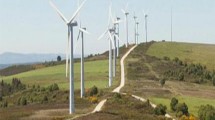Abstract
Future power systems encourage the use of renewable energy resources, among them wind power is of great interest, but its power output is intermittent in nature which can affect the stability of the power system and increase the risk of blackouts. Therefore, a forecasting model of the wind speed is essential for the optimal operation of a power supply with an important share of wind energy conversion systems. In this paper, two wind speed forecasting models based on multiple meteorological measurements of wind speed and temperature are proposed and compared according to their mean squared error (MSE) value. The first model concerns the artificial intelligence based on neural network (ANN) where several network configurations are proposed to achieve the most suitable structure of the problem, while the other model concerned the Adaptive Neuro-Fuzzy Inference System (ANFIS). To enhance the results accuracy, the invalid input samples are filtered. According to the computational results of the two models, the ANFIS has delivered more accurate outputs characterized by a reduced mean squared error value compared to the ANN-based model.
Access this chapter
Tax calculation will be finalised at checkout
Purchases are for personal use only
Similar content being viewed by others
References
Buck, M., Graf, A., Graichen, P.: The big picture. Ten priorities for the next European Commission to meet the EU’s 2030 targets and accelerate towards 2050. European Energy Transition (2019). https://www.agora-energiewende.de
Tascikaraoglu, A., Uzunoglu, M.: A review of combined approaches for prediction of short-term wind speed and power. Renew. Sustain. Energy Rev. 34, 243–254 (2014). https://doi.org/10.1016/j.rser.2014.03.033
Naik, J., Satapathy, P., Dash, P.K.: Short-term wind speed and wind power prediction using hybrid empirical mode decomposition and kernel ridge regression. Appl. Soft Comput. 70, 1167–1188 (2018). https://doi.org/10.1016/j.asoc.2017.12.010
Georgilakis, P.S.: Technical challenges associated with the integration of wind power into power systems. Renew. Sustain. Energy Rev. 12(3), 852–863 (2008). https://doi.org/10.1016/j.rser.2006.10.007
Sohoni, V., Gupta, S.C., Nema, R.K.: A critical review on wind turbine power curve modelling techniques and their applications in wind based energy systems. J. Energy 2016, 1–18 (2016). https://doi.org/10.1155/2016/8519785
Lei, M., Shiyan, L., Chuanwen, J., Hongling, L., Yan, Z.: A review on the forecasting of wind speed and generated power. Renew. Sustain. Energy Rev. 13(4), 915–920 (2009). https://doi.org/10.1016/j.rser.2008.02.002
Soman, S.S., Zareipour, H., Malik, O., Mandal, P.: A review of wind power and wind speed forecasting methods with different time horizons. In: North American Power Symposium (2010). https://doi.org/10.1109/naps.2010.5619586
Chang, W.Y.: A Literature review of wind forecasting methods. J. Power Energy Eng. 2, 61–168 (2014). ee.2014.24023. https://doi.org/10.4236/jp
Samadianfard, S., et al.: Wind speed prediction using a hybrid model of the multi-layer perceptron and whale optimization algorithm. J. Energy Rep. 6, 1147–1159 (2020). https://doi.org/10.1016/j.egyr.2020.05.001
Zheng, D., Shi, M., Wang, Y., Eseye, A., Zhang, J.: Day-ahead wind power forecasting using a two-stage hybrid modeling approach based on SCADA and meteorological information, and evaluating the impact of input-data dependency on forecasting accuracy. Energies 10(12), 1988 (2017). https://doi.org/10.3390/en10121988
Wu, Y.K., Lee, C.Y., Tsai, S.H., Yu, S.N.: Actual experience on the short-term wind power forecasting at Penghu-From an Island perspective. In: Proceedings of the 2010 International Conference on Power System Technology, pp. 1–8 (2010). https://doi.org/10.1109/powercon.2010.5666619
Chang, W.Y.: Application of back propagation neural network for wind power generation forecasting. Int. J. Digit. Cont. Technol. Its Appl. 502–509 (2013). https://doi.org/10.4156/jdcta.vol7.issue4.61
Yang, Z.L., Liu, Y.K., Li, C.R.: Interpolation of missing wind data based on ANFIS. Renew. Energy 36, 993–998 (2011). https://doi.org/10.1016/j.renene.2010.08.033
Zeng, J.W., Qiao. W.: support vector machine-based short-term wind power forecasting. In: Proceedings of the IEEE/PES Power Systems Conference and Exposition, Phoenix, pp. 1–8 (2011). https://doi.org/10.1109/psce.2011.5772573
Jursa, R., Rohrig, K.: Short-term wind power forecasting using evolutionary algorithms for the automated specification of artificial intelligence models. Int. J. Forecast. 24, 694–709 (2008). https://doi.org/10.1016/j.ijforecast.2008.08.007
Catalão, J.P.S., Pousinho, H.M.I., Mendes, V.M.F.: Short-term wind power forecasting in Portugal by neural networks and wavelet transform. Renew. Energy 36, 1245–1251 (2011). https://doi.org/10.1016/j.renene.2010.09.016
Hecht-Nielsen. R.: Theory of the backpropagation neural network. In: Neural Networks for Perception, pp. 65–93. Academic Press, Boston (1992). https://doi.org/10.1109/ijcnn.1989.118638
Dongale, T.D., Patil, K.P., Vanjare, S.R., Chavan, A.R., Gaikwad, P.K., Kamat, R.K.: Modelling of nanostructured memristor device characteristics using artificial neural network (ANN). J. Comput. Sci. 11, 82–90 (2015). https://doi.org/10.1016/j.jocs.2015.10.007
Ronald, P.K.: Outliers in process modeling and identification. IEEE Trans. Control Syst. Technol. 10, 55–63 (2002). https://doi.org/10.1109/87.974338
Gholami, A., et al.: A methodological approach of predicting threshold channel bank profile by multi-objective evolutionary optimization of ANFIS. Eng. Geol. 239, 298–309 (2018). https://doi.org/10.1016/j.enggeo.2018.03.030
Abdulshahed, A.M., Longstaff, A.P., Fletcher, S.: The application of ANFIS prediction models for thermal error compensation on CNC machine tools. Appl. Soft Comput. 27, 158–168 (2015). https://doi.org/10.1016/j.asoc.2014.11.012
Sushmita, M., Hayashi, Y.: Neuro-fuzzy rule generation: survey in soft computing framework. IEEE Trans. Neural Netw. 11, 748–768 (2000). https://doi.org/10.1109/72.846746
Vahidnia, M.H., Alesheikh, A.A., Alimohammadi, A., Hosseinali, F.: A GIS-based neuro-fuzzy procedure for integrating knowledge and data in landslide susceptibility mapping. Comput. Geosci. 36, 1101–1114 (2017). https://doi.org/10.1016/j.cageo.2017.04.004
Author information
Authors and Affiliations
Corresponding author
Editor information
Editors and Affiliations
Rights and permissions
Copyright information
© 2022 ICST Institute for Computer Sciences, Social Informatics and Telecommunications Engineering
About this paper
Cite this paper
Amoura, Y., Pereira, A.I., Lima, J. (2022). A Short Term Wind Speed Forecasting Model Using Artificial Neural Network and Adaptive Neuro-Fuzzy Inference System Models. In: Afonso, J.L., Monteiro, V., Pinto, J.G. (eds) Sustainable Energy for Smart Cities. SESC 2021. Lecture Notes of the Institute for Computer Sciences, Social Informatics and Telecommunications Engineering, vol 425. Springer, Cham. https://doi.org/10.1007/978-3-030-97027-7_12
Download citation
DOI: https://doi.org/10.1007/978-3-030-97027-7_12
Published:
Publisher Name: Springer, Cham
Print ISBN: 978-3-030-97026-0
Online ISBN: 978-3-030-97027-7
eBook Packages: Computer ScienceComputer Science (R0)




